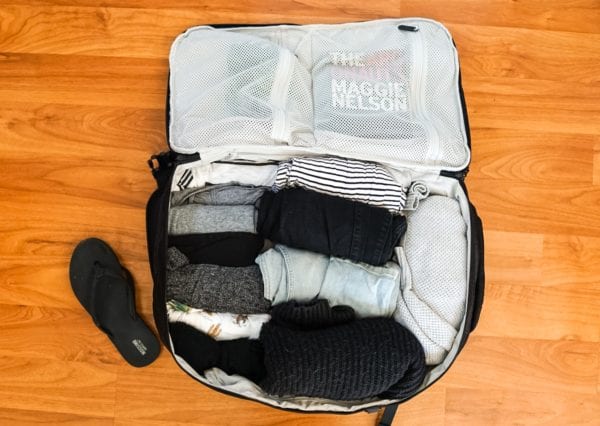When you’re on the road, you quickly realize how annoying it is to lug around heavy bags. Being able to keep your bag organized and efficiently utilize all the space you have is just as important as not packing as much, which is why a good packing list is essential. Knowing how to roll your clothes for packing is, therefore, one of the most useful skills to have when traveling, despite its seemingly inconsequential nature. Read on to learn the ins and outs of this crucial topic!
What’s the Difference Between Rolling and Folding?
Let’s get one thing straight: we’re not against folding. Many items of clothing, such as jackets and heavy sweaters, are actually easier to fold rather than roll. And if you’re skilled at intricate folds, we say go for it.
However, there is a lot of room for error when folding. If you don’t fold things correctly, your clothing may not stack properly. Bulky stacks of clothing not only take up extra space, but they can also shift in transit, even if you use the best luggage brands or best luggage sets. This shifting causes friction, which is one of the primary causes of wrinkling.
Rolling, on the other hand, produces equal-sized parcels of clothing that can then be tucked into packing cubes or a suitcase. These uniform rolls help you save space and reduce movement. Consider a nested canister of potato chips versus a bag of chips in which everything moves, and you’ll get the idea.
Brilliant Packing Hack: Why Should You Roll Clothes for Packing?
The do’s and don’ts of packing always include rolling. Of course, it belongs in the first category.
How can transforming your clothes into sausages help you fit your Instagram-worthy wardrobe into a suitcase? Rolling squeezes air out between layers and condenses the fabric, saving even more space.
It also changes how you pack: the entire compartment becomes a Tetris game, with you consciously keeping things more organized. As a result, you pack more carefully rather than haphazardly stacking items on top of one another.
When you can see where things go, you have more control over what you bring and what you leave behind. Overpacking and underpacking will no longer be an issue. Furthermore, things are easier to unpack when needed.
Another advantage of having a collection of neatly tight “sausages” is that they are all the same size. Unlike piles, tightly packed “rolls” eliminate almost every potential fold line. Your clothes have fewer wrinkles and creases.
Rolling is always mentioned on almost every travel packing hack list. Furthermore, it is frequently at the top of the list. It’s no surprise that this is the case for the reasons stated above. Change the way you pack with this method, and you’ll see the magic.
How to Roll Clothes for Packing: Getting It Right From the Start
The detailed instructions for rolling clothes for packing could not be simpler.
Simply laying your clothes on a flat surface and rolling them up sounds simple enough. Here’s the trick that changes everything: Fold your clothes from one end first. This is sometimes referred to as Ranger Rolling, a technique allegedly developed by the United States Army.
For your convenience, I’ve included a step-by-step guide:
- Flip the bottom part of the garment inside out about two or three inches after laying it out flat.
- Fold your sleeves in, then the entire piece in half.
- Repeat for the other half.
- Turn the clothes inside out.
- Begin rolling tightly from top to bottom.
- Finally, wrap the scrolls in a “pouch” made from the flipped part. And there you have it, your own “burritos.”
To avoid wrinkles or creases, remember to smooth your seams before rolling.
If you do it correctly, the rolls will not come undone easily. The entire piece should be placed inside the “pouch.” Some clothing items necessitate additional steps, but this is the general method for rolling clothes for packing.
All that remains is to tuck everything into the proper section of the suitcase or backpack.
Simply slide your rolls out of the section when you want to remove them. They will not appear depressed or tired when they emerge from your suitcase.
How to Roll Each Garment Type
Who is the rolling method intended for? The answer applies to everyone. Although it will take more time to fold your clothes into a more compact form, the space savings alone make it worthwhile.
The steps to roll clothes for packing are simple and almost universal, similar to how to fold any piece of clothing. It’s almost a one-size-fits-all situation. However, there is a slight difference or extra step for different types of garments.
How to Roll Your Pants
- Fold the waistband inside out a few inches (don’t forget the buttons and zippers, if any).
- Legs should be overlapping.
- Fold each leg in half (towards the center).
- Begin rolling from your feet to your waist.
- Wrap the flipped waist around the pants once you’ve reached it.
- You can wrap your belt around any completed rolls in this manner.
Rolling Sweaters/Jumpers/Hoodies
- Turn the bottom section up a few inches.
- Crisscross sleeves – fold one sleeve inward toward the opposite side, then the other.
- Fold your sweaters or jumpers in half.
- Begin rolling and wrap the turn-up portion around the rolls.
Tips: An elastic band can be used to secure the rolls in place, which is especially useful for bulky clothing.
Sock Rolling Instructions
- Place the two socks on top of each other, making sure that one is lower than the other.
- Roll from the toes/bottom to the upper part as usual.
- Wrap the sock that is in a higher position around the entire piece.
Underwear Rolling
- Roll about two-thirds of the underwear.
- Bring both sides of the table to the center.
- To wrap the entire thing, fold and push the crotch section.
Rolling Winter Jackets
The only difference between sweaters and dresses is how you handle the sleeves.
- Zip it up all the way.
- Fold the front sleeve to lay parallel to the waistline.
- Next, fold one-third of the body, followed by the remaining side.
- When you’re finished, roll and tuck it all into your coat.
Tip: To save more space, make the scrolls as tight as possible when rolling them.
Do You Fold or Roll Your Clothes?
Rolling your clothes is simple, and the benefits are enormous.
It’s not that folding is ineffective. It’s just that each style has advantages and disadvantages. If you choose one method over the other (or even a little of both), you will benefit in different ways.
T-shirts, casual dresses, pants, underwear, socks, and light sleepwear are examples of soft-fabric garments that should be rolled. You should fold your clothes if they are thick and bulky.
Items made of cotton, linen, and wool, for example, should be folded. Because of the natural fabric used, they can take up more space when rolled.
In any case, both methods will save you space in your suitcase. If you want to travel light or with only a carry-on, you should use both rolling and folding techniques in your packing.
If you’re using packing cubes, either method will suffice. Let’s take a look at fold vs. roll, the age-old debate of every wanderlust—the benefits and drawbacks of each technique.
Rolling
Your mode of transportation will be determined by how you pack. Do you want to travel light and have a carefree adventure?
Pros:
- Save space by compressing and organizing everything. Instead of a pile of clothes, you get a visually appealing display of distinct and easily accessible rolls.
- Suitable for stretchy materials such as lycra or polyester clothing. Ideal for socks, underwear, and scarves as well.
- It is suitable for both suitcases and backpacks. It would be a breeze to unpack.
- If you want to travel light, rolling is the way to go (just take your bag and go whenever).
Cons:
- Takes your time rolling, especially if you have to repeat the process for each piece of clothing.
- T-shirts, jeans, trousers, formal wear, dresses, and swimsuits may be difficult to roll.
Folding
Pros:
- Little effort is required, especially when everything is simply removed from the drawer and placed directly into the suitcase.
- Packing and unpacking take less time. As a result, it works best for outfits you’ll wear when you arrive at your destination.
- Clothes that are bulky can be folded. Formal clothing, such as business suits or button-up shirts, will wrinkle when rolled up but will hold their shape well when folded.
Cons:
- Folded clothes have more wrinkles and creases. This is due to the sharp edges that it has.
- It’s more difficult to dig around for the missing pieces. If you move your luggage jugs around, everything will most likely shift from its original position.
The takeaway here is that each method should be used in different situations. Certain items should be hung, folded, or rolled. You only need to focus on the material and your requirements.
Folding is the best option for quick packing. If, on the other hand, you prefer to stay organized and save space, start making those rolls right away.
Mistakes to Avoid When Packing Clothes
Knowing how to roll clothes for packing is a good starting point, but there are additional actions that will have you packing like a pro in no time. Avoid the beginner mistakes listed below.
- Begin with wrinkled items. Wrinkles do not magically disappear during transportation (though we wish they did!). Starting with wrinkle-free clothing will result in crisper-looking clothes when you arrive.
- Overstuffing. We’re all for making the most of your suitcase space, but cramming it to the brim will leave your clothes looking like the last mangled chips at the bottom of the bag.
- Putting in heavy shoes. Shoes should be placed in corners or under clothing to avoid scuffing your clothes.
- Clothing for “just in case.” Doing your homework is one of the best ways to pack lighter when traveling. Check the weather in your destination and the itinerary for your trip to ensure that you only bring clothing that you will absolutely need. Keep “what if?” items at home. Leave it out when in doubt.
- Leaving out the packing cubes. These lightweight fabric containers keep you organized while traveling. They’re also great for keeping underwear hidden from prying eyes if your bag is searched.
- Pack your bulkiest items first. By being strategic about what you wear on the plane or in the car as you travel to your destination, you can save space in your bag and reduce the weight of your luggage. Instead of packing your heaviest, bulkiest items, dress in them (think hiking boots, winter coats, and heavy sweaters).
Do Rolling Clothes Prevent Crease?
Everyone’s worst nightmare is landing and showing up in a wrinkled outfit. Rolling can help you avoid that situation. Remember to make the rolls as tight as possible to avoid as many bends and creases as possible.
However, rolling does not guarantee a wrinkle-free finish. You should hang up your clothes as soon as you arrive at the hotel or bring a mini travel steam iron with you.
Do Rolled Clothes Add Weight?
No, they don’t. The weight of your loads cannot be changed by any technique, roll, or fold. It, on the other hand, keeps things neat and makes more room. This means you can stuff more into the empty space left by the compressed items.
Should Jeans Be Rolled or Folded in a Suitcase?
Jeans and denim clothing are bulky and difficult to pack. However, they can still be packed as rolls, just like any other garment. You can follow the rolling instructions outlined above.
There is, however, more than one way to pack jeans. CabinZero will introduce a new method that combines folding and rolling:
- To begin, place your denim on a flat surface.
- Second, fold the leg diagonally to the side.
- Roll the jeans from the waist up.
- Tuck the side leg inside out to form a pouch.
- Wrap the “pouch” around the rolls last.
Is It Okay to Roll Your Clothes?
Yes, especially if you’re looking to save some space. They’re ideal for T-shirts, pants, casual dresses, and light pyjamas. This technique will not save as much space for bulkier garments.
If you’re still not convinced, try packing in two different ways: with and without rolling. Take a photo and then compare it. The outcomes may surprise you. If so, please share it with us in the comments section.
Less Hassle, More Fun: How to Roll Clothes for Packing
Rolling is one of the most popular travel tips, whether it’s for a long or short trip. Try it once and you’ll understand why. Rolling aids in space conservation and organization.
But do you know what propels them forward? Make use of a packing cube or compression bag! It’s the ideal combination for any traveler. However, rolling is not limited to the road. Why not do the same with the rest of your drawers?
Please also remember to share this article with your traveling companions so they can learn about this fantastic trick. Your travel has been improved; now it’s your turn to improve others.’
Related Articles
- 401(K) ROLLOVER TO IRA: Everything You Should Know
- 15 TOP RATED LUGGAGE IN 2023
- HOW TO ROLL OVER A 401K: How to Roll Over to New Employer, IRA & Best Place to Do It
- What to Do With 401(K) After Leaving a Job: Best Practices in 2023
- FOLDABLE PHONES: Best Foldable Phones To Get In 2023






